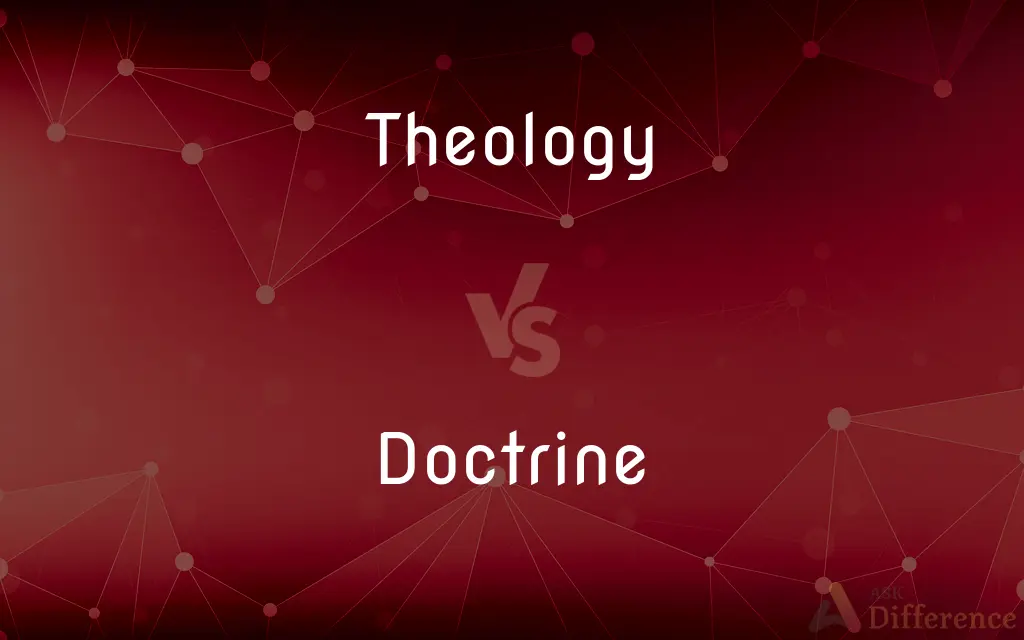Theology vs. Doctrine — What's the Difference?
By Urooj Arif & Fiza Rafique — Updated on March 8, 2024
Theology involves the study of the divine and religious beliefs, while doctrine refers to specific teachings and principles within a religion.

Difference Between Theology and Doctrine
Table of Contents
ADVERTISEMENT
Key Differences
Theology is a broad field that encompasses the study of religious beliefs, practices, and the nature of the divine. It often involves critical analysis, interpretation, and understanding of religious texts and concepts. Doctrine, on the other hand, consists of the specific teachings and principles set forth by a religious tradition or denomination, serving as a guide for faith and practice. Theology provides a framework for exploring and understanding the divine, whereas doctrine offers concrete teachings within that framework.
While theology can vary widely among individuals and traditions, reflecting personal interpretations and scholarly research, doctrine tends to be more standardized within a religious group, often codified in creeds or statements of faith. Theologians may debate and discuss the nuances of belief and the nature of the divine, engaging in a broad, exploratory dialogue. In contrast, doctrines are typically established by religious authorities and are expected to be accepted and adhered to by members of the religious community.
Theology and doctrine also differ in their application and purpose. Theology seeks to deepen understanding and foster an individual's relationship with the divine through study and reflection. It can be academic or personal, and it encompasses a wide range of perspectives and methodologies. Doctrine, however, aims to define and maintain the core beliefs of a religious community, providing a clear basis for faith and practice. It often serves to unify believers around a set of shared teachings.
The development of theology can lead to changes or reinterpretations of doctrine over time as scholars, clerics, and believers reflect on their faith and its application in changing contexts. This dynamic interplay highlights how theology can influence doctrine, even as doctrine provides a foundation for theological inquiry. The study of theology might prompt discussions on the interpretation of doctrines, potentially leading to reforms or shifts in understanding within a religious tradition.
Despite their differences, theology and doctrine are interrelated, with each influencing and shaping the other. Theology provides the intellectual and spiritual groundwork for understanding the divine, while doctrine articulates specific beliefs and practices derived from theological reflection. Together, they contribute to the depth and richness of religious tradition, guiding believers in their faith journey.
ADVERTISEMENT
Comparison Chart
Definition
Study of the divine and religious beliefs
Specific teachings and principles of a religion
Purpose
Understanding, exploration of religious concepts
Guiding faith and practice
Nature
Broad, interpretative, and inclusive
Specific, standardized, and prescriptive
Application
Academic and personal reflection
Practical guidance in faith and life
Development
Evolves through study and dialogue
Established by religious authorities
Compare with Definitions
Theology
A field that includes a variety of perspectives and methodologies.
Comparative theology compares the beliefs and practices of different religions.
Doctrine
A set of beliefs or teachings held by a religious group.
The doctrine of the Trinity is central to many Christian denominations.
Theology
The intellectual study of religious beliefs, practices, and experiences.
Through theology, she explored the complex relationship between faith and reason.
Doctrine
Principles or positions, especially regarding ethical issues.
The doctrine includes teachings on social justice and morality.
Theology
A discipline that seeks to understand the nature of the divine.
His interest in theology led him to study various world religions.
Doctrine
Official teachings approved by religious authorities.
Church doctrine dictates the practices and beliefs of its members.
Theology
The exploration of existential questions through a religious lens.
Theology addresses questions about the meaning of life and the existence of God.
Doctrine
Teachings that differentiate one religious group from another.
The doctrine of reincarnation distinguishes certain religions from others.
Theology
The process of interpreting sacred texts and traditions.
Theology involves critical analysis and interpretation of religious scriptures.
Doctrine
A codified set of beliefs used for instruction and guidance.
Religious education often involves learning the core doctrines of the faith.
Theology
Theology is the systematic study of the nature of the divine and, more broadly, of religious belief. It is taught as an academic discipline, typically in universities and seminaries.
Doctrine
Doctrine (from Latin: doctrina, meaning "teaching, instruction") is a codification of beliefs or a body of teachings or instructions, taught principles or positions, as the essence of teachings in a given branch of knowledge or in a belief system. The etymological Greek analogue is "catechism".Often the word doctrine specifically suggests a body of religious principles as promulgated by a church.
Theology
The study of the nature of God and religious truth; rational inquiry into religious questions.
Doctrine
A principle or body of principles presented for acceptance or belief, as by a religious, political, scientific, or philosophic group; dogma.
Theology
A system or school of opinions concerning God and religious questions
Protestant theology.
Jewish theology.
Doctrine
A rule or principle of law, especially when established by precedent.
Theology
A course of specialized religious study usually at a college or seminary.
Doctrine
A statement of official government policy, especially in foreign affairs and military strategy.
Theology
(uncountable) The study of God, a god, or gods; and of the truthfulness of religion in general.
Doctrine
(Archaic) Something taught; a teaching.
Theology
(uncountable) religious studies
Doctrine
(countable) A belief or tenet, especially about philosophical or theological matters.
The incarnation is a basic doctrine of classical Christianity.
The four noble truths summarise the main doctrines of Buddhism.
Theology
(countable) An organized method of interpreting spiritual works and beliefs into practical form.
Doctrine
The body of teachings of an ideology, most often a religion, or of an ideological or religious leader, organization, group, or text.
What is the understanding of marriage and family in orthodox Marxist doctrine?
Theology
(countable) A particular belief within a religion.
Doctrine
(countable) A self-imposed policy governing some aspect of a country's foreign relations, especially regarding what sort of behavior it will or will not tolerate from other countries.
Theology
Subjective marginal details.
Doctrine
Teaching; instruction.
He taught them many things by parables, and said unto them in his doctrine, Hearken.
Theology
The science of God or of religion; the science which treats of the existence, character, and attributes of God, his laws and government, the doctrines we are to believe, and the duties we are to practice; divinity; (as more commonly understood) "the knowledge derivable from the Scriptures, the systematic exhibition of revealed truth, the science of Christian faith and life."
Many speak of theology as a science of religion [instead of "science of God"] because they disbelieve that there is any knowledge of God to be attained.
Theology is ordered knowledge; representing in the region of the intellect what religion represents in the heart and life of man.
Doctrine
That which is taught; what is held, put forth as true, and supported by a teacher, a school, or a sect; a principle or position, or the body of principles, in any branch of knowledge; any tenet or dogma; a principle of faith; as, the doctrine of atoms; the doctrine of chances.
Articles of faith and doctrine.
Unpracticed he to fawn or seek for powerBy doctrines fashioned to the varying hour.
Theology
The rational and systematic study of religion and its influences and of the nature of religious truth
Doctrine
A belief (or system of beliefs) accepted as authoritative by some group or school
Theology
A particular system or school of religious beliefs and teachings;
Jewish theology
Roman Catholic theology
Theology
The learned profession acquired by specialized courses in religion (usually taught at a college or seminary);
He studied theology at Oxford
Common Curiosities
Is doctrine the same across all religions?
No, doctrines vary widely among different religions and even within denominations of the same religion.
Who determines religious doctrine?
Doctrine is typically established and maintained by religious authorities or governing bodies of a religious tradition.
Can someone study theology without adhering to a specific doctrine?
Yes, theology can be studied academically with an objective perspective, without committing to a specific religious doctrine.
Can doctrines evolve over time?
Yes, doctrines can evolve as a result of theological inquiry, societal changes, and internal debates within a religious community.
What role do creeds play in doctrine?
Creeds summarize core doctrines and serve as formal statements of belief for many religious communities.
What is the main difference between theology and doctrine?
Theology is the study and interpretation of religious beliefs and the divine, while doctrine refers to the specific teachings and principles of a religion.
Can theology change doctrine?
Yes, theological reflection and dialogue can lead to changes or reinterpretations of doctrine over time.
What challenges can arise from doctrinal differences?
Doctrinal differences can lead to divisions within religious communities or between different faith traditions.
Is it possible for doctrines to conflict with each other?
Yes, different religious traditions or denominations may have conflicting doctrines on various issues.
How does doctrine affect a religious community?
Doctrine provides a foundation for the beliefs and practices of a community, guiding faith and moral conduct.
How do theologians contribute to the understanding of doctrine?
Theologians analyze, interpret, and discuss religious texts and beliefs, which can deepen the understanding of doctrine.
Why is theology important to religion?
Theology helps individuals and communities explore and understand their faith more deeply, fostering spiritual growth.
Is there a difference between religious and secular doctrine?
Yes, religious doctrine pertains to spiritual beliefs and practices, while secular doctrine can refer to principles or policies in non-religious contexts.
How are new doctrines established?
New doctrines can emerge from theological debates, reinterpretation of texts, or the need to address contemporary issues.
How does one study theology?
Studying theology can involve academic coursework, personal study of religious texts, and engagement in religious communities.
Share Your Discovery

Previous Comparison
Bedrel vs. Bedel
Next Comparison
Bohemian vs. EccentricAuthor Spotlight
Written by
Urooj ArifUrooj is a skilled content writer at Ask Difference, known for her exceptional ability to simplify complex topics into engaging and informative content. With a passion for research and a flair for clear, concise writing, she consistently delivers articles that resonate with our diverse audience.
Co-written by
Fiza RafiqueFiza Rafique is a skilled content writer at AskDifference.com, where she meticulously refines and enhances written pieces. Drawing from her vast editorial expertise, Fiza ensures clarity, accuracy, and precision in every article. Passionate about language, she continually seeks to elevate the quality of content for readers worldwide.














































